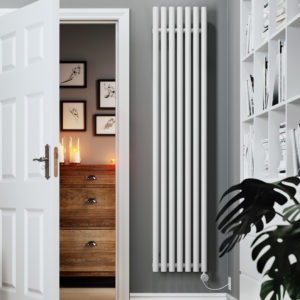How Much Do Electric Radiators Cost to Run Now?
With energy bills skyrocketing across Great Britain, many homeowners are considering electric convection heaters or storage heaters as potentially cheaper alternatives to their existing gas central heating systems. But how much will it actually cost you to run electric radiators in your home?
In this comprehensive guide we’ll cover all the key factors that determine electric heating running costs, provide typical price examples, outline the best ways to save money, and answer some common questions people have around affordability.
What Impacts the Running Costs of Electric Heating?
Several important variables influence how much you’ll pay to run electric radiators or storage heaters:
Electricity Tariff Rates
The cost per kWh your supplier is charging makes a huge difference. Those able to fix prices through 2023 and 2024 using the Energy Price Guarantee will pay far less than others on the capped variable rate. Shopping around is vital.

Power Output of Radiators
The wattage rating of your heaters determines electricity draw. For example, a 2,000W radiator uses twice as much energy over one hour as a 1,000W model. Match radiator power to room size correctly.
Hours of Use Per Day
The total hours your system runs for daily throughout winter impacts usage significantly. 5 hours per day for a 2kW convection heater won’t cost the same as having it on over 15 hours on cold days.
Thermostat Temperature Settings
The warmer you have rooms set on thermostats, the more heat requested and power consumed. Recommended is 18-21°C daytime. Each 1° extra adds around 10% on your bill.
Energy Efficiency of Property
New builds or well insulated homes retain warmth for longer between heating cycles, meaning less energy required. Improving insulation helps cut usage.
Now let’s analyse typical running costs based on these factors:
What Are Average Electric Heating Running Costs?
It’s difficult to give precise figures that will apply universally, as home heating needs vary enormously based on size, occupancy levels and energy efficiency standards. However, here are some rough estimates for typical UK households:
- A single 2kW convection heater run for 4-5 hours per day might cost £300-375 per year under the current Energy Price Guarantee rates.
- Heating a small 2 bed flat requiring around 5kW of radiators for 5 hours a day may cost £625-£750 annually.
- An adequately heated 4 bedroom semi-detached home using 15-20kW of storage & convection heating for 4-6 hours daily could cost £1,500-£2,000 per annum.
- The above running costs would all be 35-50% higher for those not protected by a fixed rate energy deal.
For a personalized estimate tailored to your home, use our electric heating cost calculator.
Energy Grants Available for Electric Heating
Many homeowners are hesitant to switch to electric systems due to perceptions of unaffordability. But for low income households, the following financial support is available:
Home Upgrade Grant
The government’s Energy Company Obligation scheme offers grants ranging from 25% to the full 100% cost for qualifying energy efficiency improvements. This can fund insulation, draught proofing upgrades and even the installation of new storage heaters or heat pumps if you receive certain means-tested benefits.
Eligible home upgrades under the grant include:
- Cavity wall insulation
- Solid wall insulation
- Double glazing installation
- Loft insulation top-ups
- Floor insulation
- Draught proofing additions
- New storage heaters
- Air source heat pump systems
Boiler Upgrade Scheme
The Boiler Upgrade Scheme will launch in April 2023. This will provide households in England and Wales grants of £5,000 for replacing old gas boilers and storage heaters with more efficient electric heat pumps. Lower income households can have the full cost covered.
So for many homes, the potential savings delivered by modern electric heating will outweigh any higher running expenses.
Tips For Reducing Electric Heating Bills
If you are set on getting new electric radiators or upgrading old storage heaters, here are some handy ways to control costs:
Install Smart Thermostatic Controls
Internet connected thermostats like Google Nest or Hive allow you to precisely schedule each room’s heating via an app. Set temperatures to drop when rooms are unused to save 15-20% on bills.
Switch to Time of Use Tariffs
An Economy 7 meter enables access to cheaper night time electricity rates. This works extremely effectively for storage heaters.
Improve Property Insulation
By upgrading loft and cavity wall insulation, replacing single glazing, and draught proofing, your home will retain warmth for longer between heating cycles – meaning less energy required.
Use Solar Panels
Combining electric heating with solar PV panels allows you to power a portion of your usage from sunlight for free, lowering fossil fuel dependence.
FAQs on Electric Radiator Running Costs
Q: Are electric heaters cheaper to run than gas central heating?
A: Rarely – gas remains slightly cheaper per kWh currently, but a modern, energy efficient electric system can get close to parity.
Q: Is storage heating cheaper than other electric options?
A: Yes – storage heaters on an Economy 7 tariff can operate for well under half the cost of convection heaters. But bill savings depend on system sizing and home heat retention levels.
Q: How much will a 2kW convection heater cost hourly to run?
A: Approximately 30-45p per hour under current Energy Price Guarantee rates, depending on your supplier’s unit costs.
Q: Should I switch heating systems because of energy price rises?
A: Weighing up installation and running costs of different options is wise. Modern electric systems are now viable long term choices thanks to improving efficiency and government support available.
Key Takeaways
- Heating a typical 3-4 bedroom home with electric radiators may cost £1500-£2000 annually based on current energy rates.
- Grants can fully or partially fund upgrades like new storage heaters for lower income households.
- Smart thermostats save 15-20% on bills through better heating control.
- Economy 7 tariffs make storage heating very affordable to operate.
- Improving your home’s insulation reduces heating requirements.
We hope this guide has given you a better understanding of potential expenditures involved with switching to electric thermal storage or convection radiator heating. Be sure to use our running cost calculator for a personalized estimate.
Markdown 7752 bytes 1077 words 113 lines Ln 113, Col 340
HTML 5659 characters 1042 words 66 paragraphs



